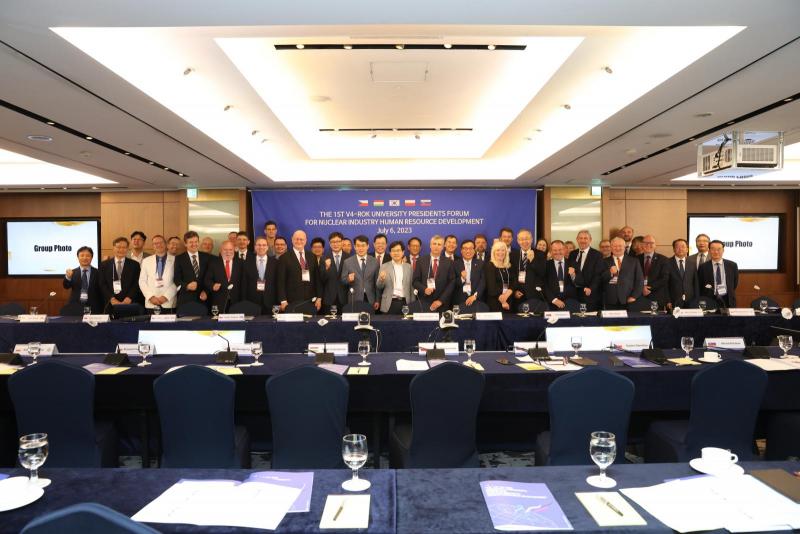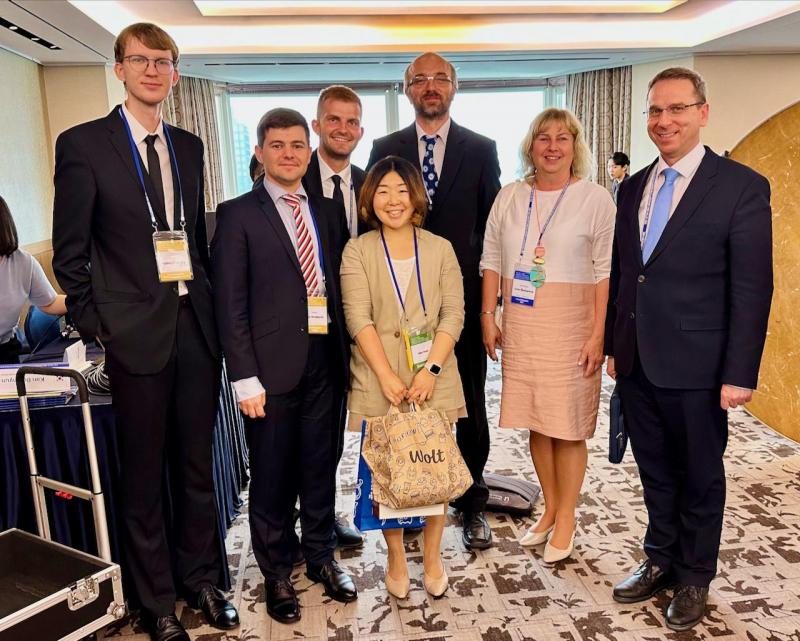
The first edition of the Korean Nuclear Forum of Korean and the Visegrad Group Universities | Autor: Jan Hruškovič
If you grow up near a nuclear power plant and one of your parents works there, it can be easy to dream about a nuclear career. Jan Hruškovič, a graduate of the Power Electrical and Electronic Engineering programme at the Faculty of Electrical Engineering and Communication at Brno University of Technology (FEEC), has had these dreams since childhood. He approached his dream of nuclear engineering step by step, and finally realised it in a way he did not expect. Thanks to his successful undergraduate studies and the recommendation of his FEEC professor, he was accepted to a small but top-notch private South Korean university, KEPCO International Nuclear Graduate School (KINGS), where he graduated with a two-year Master's degree in Nuclear Power Plant Engineering (NPP) in 2023.
Although covid lockdown complicated his challenging studies, they were more than successful in the end. In his senior year, Jan Hruškovič served as president of the student union, was acclaimed as the best student of his graduating class, and received a prestigious scholarship from the Korean Nuclear Society. He works as a nuclear engineer for a major private Korean nuclear company now.
Apart from the demanding study work, the intensive cooperation between BUT and KINGS also contributed to the fulfilment of one dream. This is particularly due to the nuclear power group around Karel Katovsky from the Department of Electrical Power Engineering of the Faculty of Electrical Engineering and Communication, which is responsible for teaching courses related to nuclear power at the faculty. It has a long-standing and very good relationship with the South Korean university, which educates students and teachers from all over the world and has a campus that is located in a unique remote location between two nuclear power plants.
Based on recommendations and an internal selection process, KINGS University accepts talented master's students from selected Czech universities (currently BUT, CTU in Prague and UWB in Pilsen) and offers them unique opportunities for further development in the field. Based on the 2019 Memorandum of Cooperation, BUT can send students on a one-semester exchange programme. This has already been used by 18 students and has been so popular that the agreement has been extended from two to four students per semester at the end of 2022.
Another study option is the aforementioned two-year Master's degree in "Nuclear Power Plant Engineering" or "Energy Policy and Engineering". In addition to Jan Hruškovič, two other graduates of the bachelor's degree programme, Dalibor Kojecký and Marek Kopeček, from the Faculty of Mechanical Engineering of the BUT, have been awarded this opportunity along with a scholarship.
Representatives of BUT were also present at the 1st. V4 – Republic of Korea University Presidents Forum
KINGS University is very active in establishing cooperation with many institutions from all over the world. The university leadership organised the first edition of the Korean Nuclear Forum of Korean and the Visegrad Group Universities (the 1st V4–Republic of Korea University Presidents Forum) in Seoul on 6 and 7 July 2023. It brought together not only university representatives, but also political representatives and ambassadors of the Republic of Korea and the V4 countries.
From left: participants of the Korean forum, BUT alumni and KINGS students D. Kojecký, J. Hruškovič, M. Kopeček, Forum Secretary Hana Kim, K. Katovský from FEEC, BUT Vice-Rector I. Šimberová and BUT Rector L. Janíček | Autor: Jan Hruškovič
Brno University of Technology was represented at the forum by the Rector Ladislav Janíček, the Vice-Rector for Internationalisation Iveta Šimberová and Karel Katovský from FEEC. There were also representatives of the Czech Technical University in Prague and the University of West Bohemia in Pilsen, universities from Warsaw, Wroclaw, Krakow, Bratislava and Budapest, with which KINGS also cooperates.
During the first day of the meeting, the forum participants presented their institutions and their involvement in nuclear education. This was followed by a technical and diplomatic discussion with emphasis on cooperation between universities, industry and countries. One of the key points in the discussion was the current shortage of professionals, students and graduates in technical fields.
The planned construction of new nuclear power plant units in the Czech Republic faces not only technological and financial challenges, but also the need to educate the next nuclear generation. Brno University of Technology is responding to this trend and is preparing a professional follow-up master's degree programme "Nuclear Power Engineering", which will be taught across the faculties of mechanical, chemical, civil and electrical engineering.
"Cooperation with top partners from the nuclear industry, to which KINGS definitely belongs, will also help to create this programme. It is closely linked to the Korean nuclear industry, which is a great motivation for us. We also plan to incorporate as many hands-on teaching methods as possible and to seek connections with industrial partners during the course of our studies. That is why we have chosen a vocational study programme," adds Karel Katovský, who is in charge of the programme.
Representatives of BUT also had the unique opportunity to visit the Institute of Nuclear Engineering at Seoul National University (SNU), Korea's most prestigious university. There, the SNU students had a short discussion with Karel Katovsky, who gave a lecture on current trends in research nuclear reactors and accelerator-driven neutron sources.
"Over the past 40 years, South Korea has become one of the world's leaders in nuclear energy utilization, in the development of nuclear research, and especially in the nuclear industry. It is one of the few countries capable of providing the complete life cycle of a nuclear power plant and building a modern third-generation pressurized water reactor unit from A to Z on its own. It certainly has a lot to offer the Central European nuclear industry. It is therefore excellent that representatives of the V4 countries and their universities have gathered in Seoul. The V4 countries, together with France, the Netherlands and Finland, are the pillars of the future of nuclear energy in the EU. The meeting offered a very interesting discussion and gave us motivation for future cooperation in teaching and doctoral research," said Karel Katovsky.
Source: vut.cz/en
Author of the text: Mgr. Petr Kubíček
